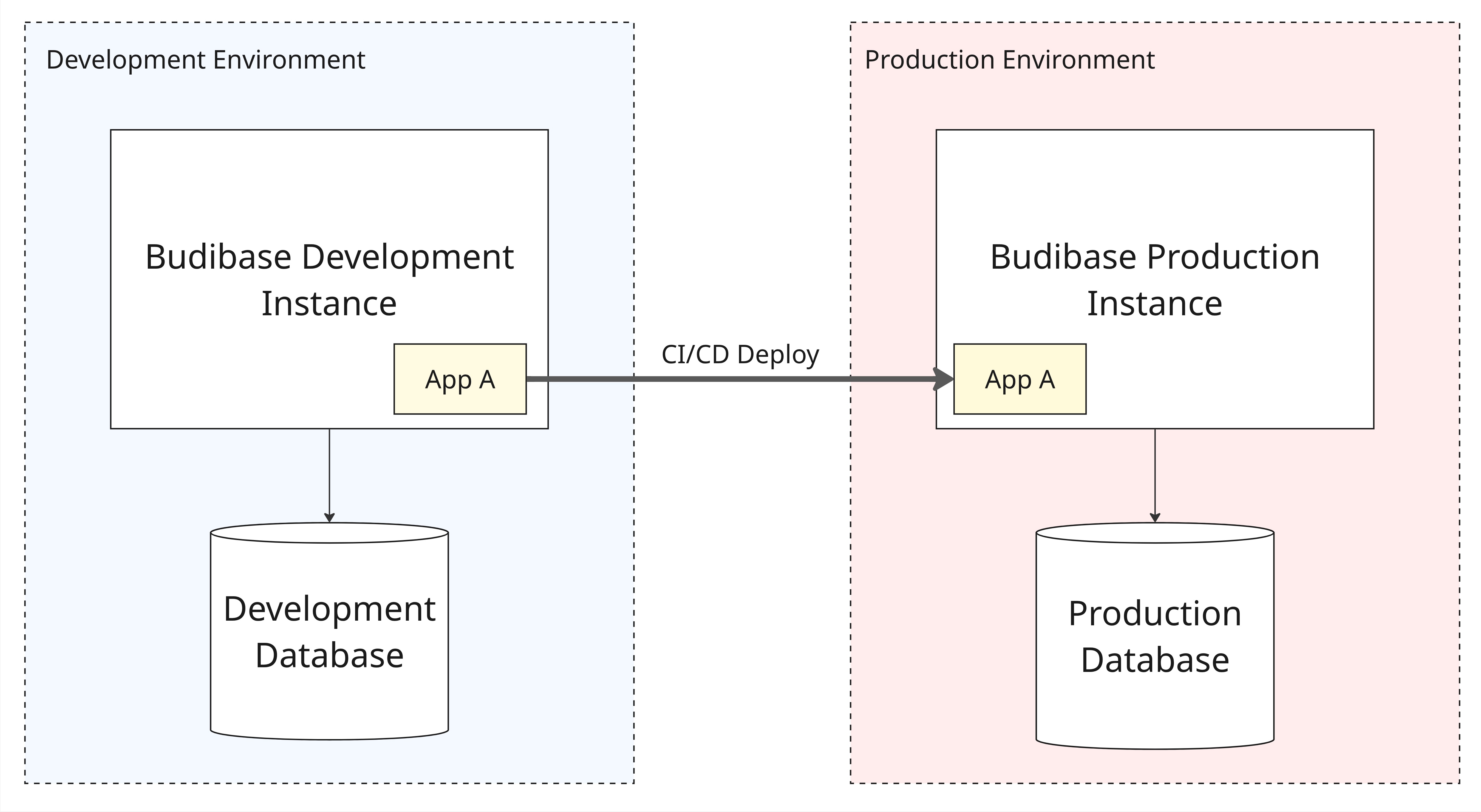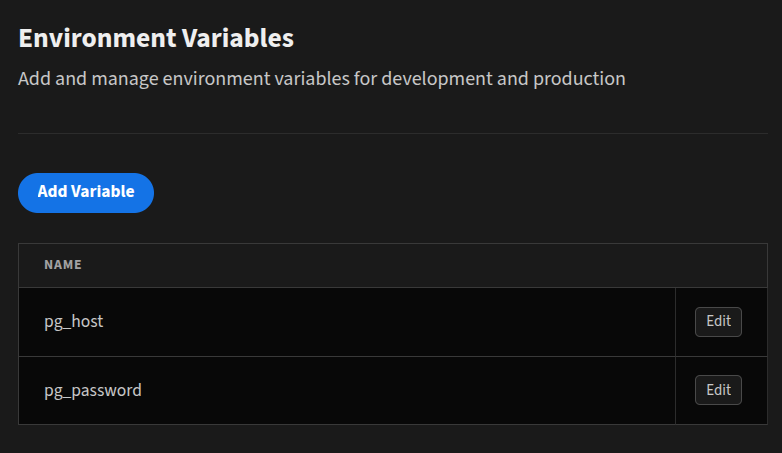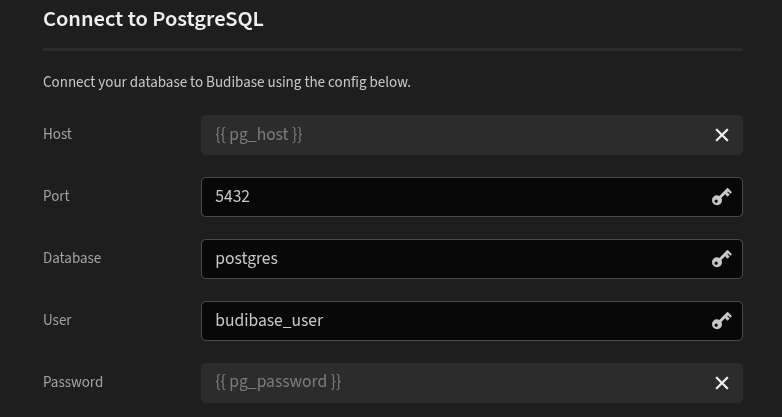Integrating with CI/CD 🔒
How to deploy apps between 2 or more Budibase instances
A common need among Budibase users is the ability to deploy two or more segregated Budibase environments and migrate app changes between them.

You can set up this deployment process using the following steps, using the Budibase API. Note that importing and exporting API endpoints are not available on free or open-source tiers.
- Export the app from the development environment.
- Import the app into the production environment.
- (Optionally) Publish the app in the production environment. If you don’t publish, then you have the opportunity to test the app in the production environment before manually publishing the app to your users.
We've written a bash script (below) that automates this process. Most CI/CD platforms support bash scripting inside their pipelines. You can use this script directly in your CI/CD process.
Using external database and APIs
If you are using an external database or API (e.g. PostgreSQL), you can use environment variables to enable your production environment to use different connection details to your development environment.
The process is as follows:
- Create the required environment variables in your Budibase development instance.
- Create environment variables of the same name, in your production instance.
- In your development app, create your database connection using the environment variables.
For example, we can add pg_host and pg_password variables in both instances.

Now I can configure my Postgres connection to use these variables.

The result: my development environment connects to a different database than my production environment, without needing to change this manually each time I deploy.
Bash script for CI/CD
Variables
The bash script below uses the following variables. You'll need to supply these variables from your CI/CD pipeline.
Variable name | Description | Example |
|---|---|---|
BUDIBASE_SOURCE_TENANT | Required The root URL of our budibase development instance. |
|
BUDIBASE_SOURCE_API_KEY | Required API Key of your development instance | |
BUDIBASE_SOURCE_APP_ID | Required The app ID that you would like to deploy You should treat this as a secret. |
Or
E.g. |
BUDIBASE_DESTINATION_TENANT | Required The root URL of our budibase production instance. |
|
BUDIBASE_DESTINATION_API_KEY | Required API Key of your production instance. You should treat this as a secret. | |
BUDIBASE_DESTINATION_APP_ID | Required The app ID that you would like to deploy |
|
BUDIBASE_PUBLISH_DESTINATION_APP | Optional Whether you'd like to auto-publish your app in production. Defaults to |
|
Script (requires cURL)
The script below saves the exported app to export.tar.gz. You may save this file as an artifact during your CI/CD process. The script could also be modified to export the existing app in your destination tenant, to store as an artifact.
#!/bin/bash
# 1. Set local variables from environment variables
# Check that all required variables are set (not empty)
if [[ -z "$BUDIBASE_SOURCE_TENANT" ]]; then
echo "Error: BUDIBASE_SOURCE_TENANT is required but not set."
exit 1
fi
if [[ -z "$BUDIBASE_DESTINATION_TENANT" ]]; then
echo "Error: BUDIBASE_DESTINATION_TENANT is required but not set."
exit 1
fi
if [[ -z "$BUDIBASE_SOURCE_API_KEY" ]]; then
echo "Error: BUDIBASE_SOURCE_API_KEY is required but not set."
exit 1
fi
if [[ -z "$BUDIBASE_DESTINATION_API_KEY" ]]; then
echo "Error: BUDIBASE_DESTINATION_API_KEY is required but not set."
exit 1
fi
if [[ -z "$BUDIBASE_SOURCE_APP_ID" ]]; then
echo "Error: BUDIBASE_SOURCE_APP_ID is required but not set."
exit 1
fi
if [[ -z "$BUDIBASE_DESTINATION_APP_ID" ]]; then
echo "Error: BUDIBASE_DESTINATION_APP_ID is required but not set."
exit 1
fi
if [[ -z "$BUDIBASE_PUBLISH_DESTINATION_APP" ]]; then
BUDIBASE_PUBLISH_DESTINATION_APP="false" # Default to false if not set
fi
# 2. Check for the existence of curl
if ! command -v curl &> /dev/null; then
echo "curl could not be found."
# 3. If curl does not exist, download it
echo "Installing curl..."
# Check for sudo privileges, as installing packages usually requires them.
if [[ $EUID -ne 0 ]]; then
echo "This script must be run as root to install curl."
exit 1
fi
apt-get update && apt-get install -y curl
else
echo "curl is already installed."
fi
# 4. Use curl to download the app export
echo "Exporting app export from $BUDIBASE_SOURCE_TENANT and app ID: $BUDIBASE_SOURCE_APP_ID..."
echo $BUDIBASE_SOURCE_TENANT/api/public/v1/applications/$BUDIBASE_SOURCE_APP_ID/export
HTTP_STATUS_EXPORT=$(curl \
--silent \
--write-out "%{http_code}" \
--request POST \
--url $BUDIBASE_SOURCE_TENANT/api/public/v1/applications/$BUDIBASE_SOURCE_APP_ID/export \
--header 'accept: application/gzip' \
--header 'content-type: application/json' \
--header "x-budibase-api-key: $BUDIBASE_SOURCE_API_KEY" \
--data '{"excludeRows":true}' \
--output ./export.tar.gz)
echo "Export HTTP status: $HTTP_STATUS_EXPORT"
if [[ "$HTTP_STATUS_EXPORT" -ne 200 ]]; then
echo "Error: Failed to export app. HTTP status code: $HTTP_STATUS_EXPORT"
exit 1
else
echo "App export successful. HTTP status code: $HTTP_STATUS_EXPORT"
echo "App export saved to export.tar.gz"
fi
# 5. Use curl to import the app export
echo "Importing app export into $BUDIBASE_DESTINATION_TENANT and app ID: $BUDIBASE_DESTINATION_APP_ID..."
HTTP_STATUS_IMPORT=$(curl \
--silent \
--output /dev/null \
--write-out "%{http_code}" \
--request POST \
--url $BUDIBASE_DESTINATION_TENANT/api/public/v1/applications/$BUDIBASE_DESTINATION_APP_ID/import \
--header 'content-type: multipart/form-data' \
--header "x-budibase-api-key: $BUDIBASE_DESTINATION_API_KEY" \
--form '[email protected];type=application/gzip')
if [[ "$HTTP_STATUS_IMPORT" -ne 200 && "$HTTP_STATUS_IMPORT" -ne 204 ]]; then
echo "Error: Failed to import app. HTTP status code: $HTTP_STATUS_IMPORT"
exit 1
else
echo "App import successful. HTTP status code: $HTTP_STATUS_IMPORT"
fi
#6 Optionally- publish the app in the destination environment
if [[ "$BUDIBASE_PUBLISH_DESTINATION_APP" == "true" ]]; then
echo "Publishing destination app with ID: $BUDIBASE_DESTINATION_APP_ID..."
HTTP_STATUS_PUBLISH=$(curl \
--silent \
--output /dev/null \
--write-out "%{http_code}" \
--request POST \
--url $BUDIBASE_DESTINATION_TENANT/api/public/v1/applications/$BUDIBASE_DESTINATION_APP_ID/publish \
--header 'accept: application/json' \
--header "x-budibase-api-key: $BUDIBASE_DESTINATION_API_KEY")
if [[ "$HTTP_STATUS_PUBLISH" -ne 200 ]]; then
echo "Error: Failed to publish app. HTTP status code: $HTTP_STATUS_PUBLISH. Your new app exists in the destination but is not published. You can publish or revert manually via Budibase."
exit 1
else
echo "Destination app published successfully."
fi
else
echo "Skipping publishing of destination app - please publish manually via Budibase."
fi
Updated 5 months ago